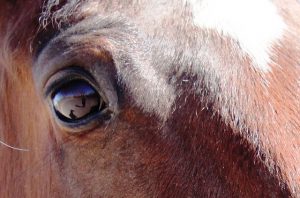How Equine Therapy Can Help People With Eating Disorders
 Equine-assisted therapy is a type of psychotherapy that employs horses as facilitators of emotional growth and healing.
Equine-assisted therapy is a type of psychotherapy that employs horses as facilitators of emotional growth and healing.
No skills or like of horses is required to participate in equine therapy, and many activities – which are supervised by a licensed mental health professional – do not involve riding. Often, tasks such as grooming, feeding, and haltering are used to create interaction between horses and clients.
Equine Sessions
The goal is for equine clients to learn something about themselves, and build life skills such emotional awareness, and confident self-expression.
During sessions, therapists pay close attention to the give and take between horse and client. A small interaction can sometimes unlock a person’s entire story, making sense of their behavior, emotional responses, and coping mechanisms.
“The way I facilitate equine-assisted therapy is to look to the horse, observe the horse-client interaction, and then follow my gut and take risks with describing and exploring what I see,” writes equine therapist Nancy Jarrell. “I continue to marvel at how a horse can behave in a certain way that results in the presentation of a crucial issue for a client. It is as though the horse already knows the history.”
How Horses Help
Jarrell points out that a horse’s response to each human being is unique. She believes they instinctively understand each person’s needs because horses are emotional creatures. Their brain is primarily made up of the limbic system, a network of neurons governing emotionality. This gives horses a remarkable ability to read human feeling and intention—and respond to it.
A horse’s response to a client suggests to the therapist what emotion needs processing, or which behaviors to discuss. However, Jarrell is confident that no issues will arise in equine therapy unless clients are ready to face them.
For those with eating disorders, working with horses adds the healing element of unconditional acceptance to their recovery process. This helps some clients face difficult feelings and memories. Caring for horses can also empower those suffering from low self esteem, negative body issues, and symptoms of anxiety, or mood disorders.
Finding An Equine Therapist
A couple helpful links for finding equine therapy in your area are listed below, or Google “equine therapy” plus your city or state.
Sources: A Healing Triangle: Clients Learn Much about Themselves through Interactions in Equine-Assisted Therapy. Contributors: Jarrell, Nancy – Author. Magazine title: Addiction Professional. Volume: 7. Issue: 1 Publication date: January-February 2009. Page number: 15+;
Eating Disorder Hope; Path Intl/Find A Loction; Eagala/Find a Program
Photo credit: netg15
 Eating Disorder Self Test. Take the EAT-26 self test to see if you might have eating disorder symptoms that might require professional evaluation. All answers are confidential.
Eating Disorder Self Test. Take the EAT-26 self test to see if you might have eating disorder symptoms that might require professional evaluation. All answers are confidential.